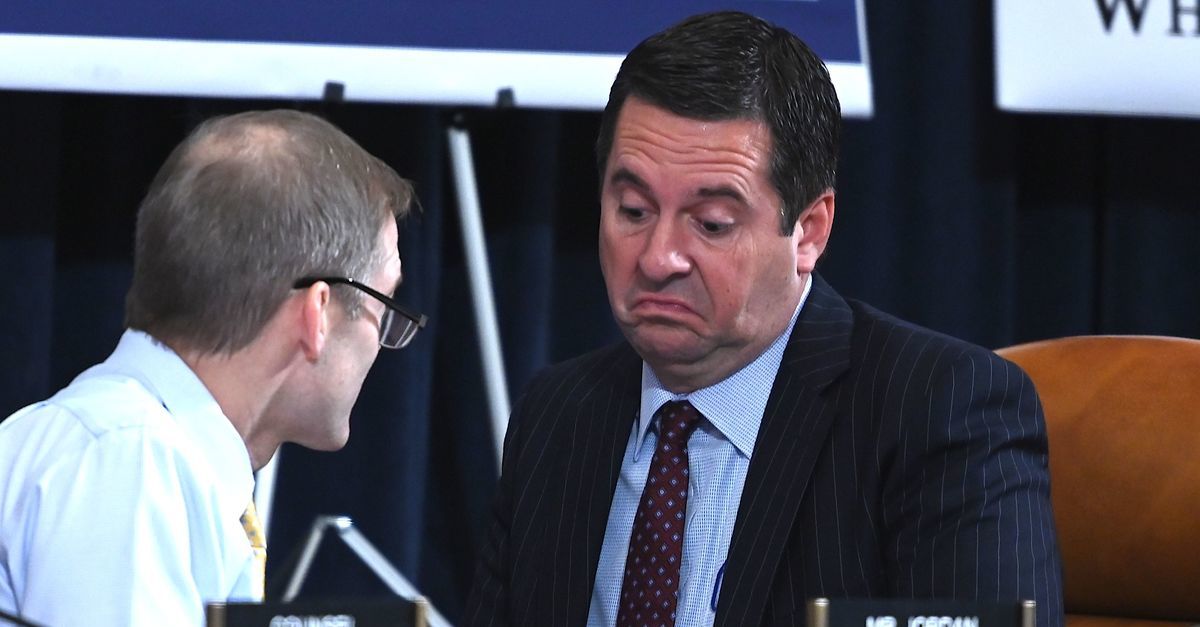
An attorney representing the intelligence community whistleblower has risen to a challenge offered by congressional Republicans as to his communications with a key individual in the ongoing impeachment saga. The problem for the House GOP, however, is that individual just so happens to be one of their own–and a high-profile member of their caucus at that.
I’ll happily tell GOP about my communications with their colleague @DevinNunes if they want. He’s the only Member I’ve spoken with abt #whistleblower.
I do appreciate the fear and deflection they are displaying though. https://t.co/BoIlHTkhTf
— Mark S. Zaid (@MarkSZaidEsq) December 5, 2019
“I’ll happily tell GOP about my communications with their colleague [Rep. Devin Nunes (R-Calif.)] if they want,” attorney Mark Zaid wrote. “He’s the only Member I’ve spoken with [about the] #whistleblower. I do appreciate the fear and deflection they are displaying though.”
That offer was in direct response to aspersions cast by Rep. Jim Banks (R-Ind.) about alleged discussions between Zaid, Rep. Adam Schiff (D-Calif.) and Hunter Biden–or some combination thereof. Banks was not clear about who he was insinuating had allegedly spoken with whom.
In a tweet late Thursday morning, Banks charged that Schiff “has repeatedly misled [the] public about his [communications with] the whistleblower” at the heart of the impeachment process.
“They deserve to know full extent of coordination,” the Indiana Republican continued. “Schiff should be held to his own standard. It’s time to see his, [Mark Zaid] and Hunter Biden’s phone records.”
To be clear, Banks’s suggestions don’t appear to be serious or based on any known, public facts. They’re also not strictly new.
Banks initially made his request in a December 4 letter addressed to Senate Judiciary Committee Chairman Sen. Lindsey Graham (R-S.C.) which also sought to implicate former Vice President Joe Biden in the would-be dragnet of perhaps-had conversations with Zaid.
“The public has a right to know with whom Rep. Adam Schiff has coordinated his impeachment effort and if America’s national security is at risk in any way as a result of Rep. Schiff’s actions,” the letter reads–somewhat inexplicably bringing the topic of national security into the conversation. It’s unclear what national security issues Banks is referring to or if the invocation of that loaded phrase is simply just an attempt to cast ever more aspersions about his political opponents.
The Banks letter does make an oblique attempt to bring national security issues into focus later on. In a two-paragraph tangent, Banks accuses House Democrats of forgetting “to pass a budget” and complains that Congress will soon be forced to pass a stopgap spending measure in order to keep the government open.
The U.S. government technically cannot run out of money, however, such determinations are largely political choices used to prioritize certain budget priorities at the expense of others and to satisfy the owners of credit reporting agencies concerned with sovereign debts.
“I know you are aware of the risks to national security should the government be forced to close while spending negotiations are held – just as running on the fumes of a continuing resolution is dangerous,” the letter argues. “If we pass a continuing resolution, the Pentagon and our military will get billions less next year than they normally would.”
Graham responded by quickly putting the kibosh on Banks’s request.
“I don’t have any desire to subpoena Adam Schiff’s phone records. We’re not going to do that,” the South Carolina Republican told reporters on Thursday. “When members start subpoenaing each other as part of Oversight, the whole system breaks down.”
Banks’s denied plea for Schiff’s phone records comes on the heels of the draft impeachment report. Republicans grumbled and fumed about the revelation that impeachment investigators with the House Intelligence Committee had obtained call logs belonging to President Donald Trump‘s personal attorney Rudy Giuliani.
The conservative line quickly became one bemoaning alleged government overreach.
Federal privacy laws, however, provide for the enforcement of government subpoenas seeking communications records under only the most strict of circumstances–circumstances which may or may not have been applicable to the Giuliani situation.
As Law&Crime previously reported, those circumstances don’t appear to apply to congressional subpoenas.
Berkeley Law Professor Orrin Kerr noted that Congress likely doesn’t function as a “governmental entity” under privacy statutes limiting the collection of communications data.
Banks and Zaid previously tangled on Twitter over the subject in more or less similar terms.
“It seems [AT&T] is willing to fork over personal phone records to anyone waving a subpoena in their face. Time for [Rep. Adam Schiff] to get a taste of his own medicine,” Banks tweeted on Wednesday–attaching a copy of a report from The Hill about his since-denied subpoena request.
“Many of my phone records would be protected by attorney-client privilege, but I can disclose they would reveal my direct contact with a specific Member of Congress, as well as his senior staff – [Devin Nunes],” Zaid said roughly an hour later.
To date, neither of Zaid’s offers have been taken up by Banks or his allies.
Although Zaid has offered an explanation for and context behind past tweets, Republicans have repeatedly accused him of supporting a coup to take down the president. The Ukraine whistleblower’s attorneys have received death threats.
[image via Andrew CABALLERO-REYNOLDS/AFP]
Have a tip we should know? [email protected]